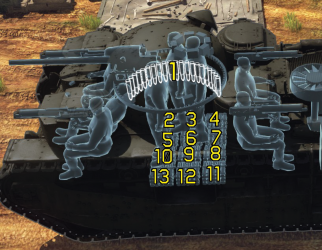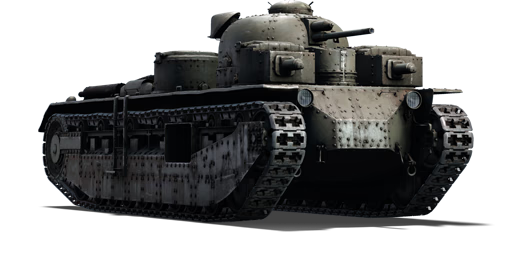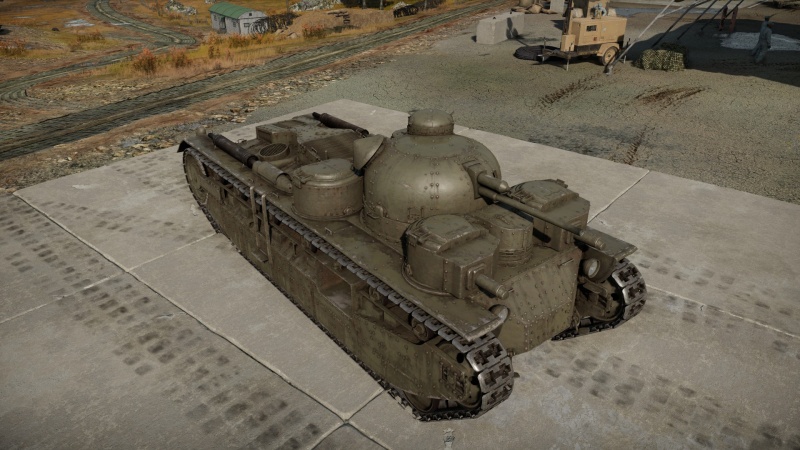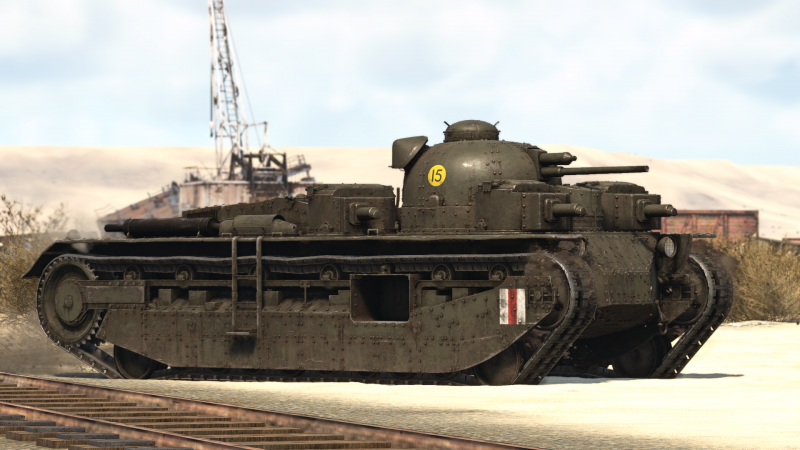Difference between revisions of "Independent"
m (→Pros and cons) (Tag: Visual edit) |
(→Description) |
||
| (2 intermediate revisions by 2 users not shown) | |||
| Line 6: | Line 6: | ||
== Description == | == Description == | ||
<!-- ''In the description, the first part should be about the history of the creation and combat usage of the vehicle, as well as its key features. In the second part, tell the reader about the ground vehicle in the game. Insert a screenshot of the vehicle, so that if the novice player does not remember the vehicle by name, he will immediately understand what kind of vehicle the article is talking about.'' --> | <!-- ''In the description, the first part should be about the history of the creation and combat usage of the vehicle, as well as its key features. In the second part, tell the reader about the ground vehicle in the game. Insert a screenshot of the vehicle, so that if the novice player does not remember the vehicle by name, he will immediately understand what kind of vehicle the article is talking about.'' --> | ||
| − | The ''' | + | The '''A1E1 Independent''' was an experimental British multi-turreted tank. Its development began in 1922 and was heavily influenced by the experience of World War I tank design, particularly in its numerous anti-infantry armament, weak armour, and large size in order to cross trenches. It was designed with reference to the French [[2C|Char 2C]], but was lighter and more manoeuvrable; the multi-turret concept would go on to influence a number of other tank designs, including the Soviet [[T-28]] and [[T-35]], and the German [[Nb.Fz.|Neubaufahrzeug]]. The first and only prototype of the A1E1 was built in 1926 and remained in service until 1935. However, at the start of World War II, the tank was returned to service and used as a static pillbox in case of German invasion of the British Isles. It survived the war and is now on display at the Bovington Tank Museum. |
| + | |||
| + | Introduced in [[Update 1.63 "Desert Hunters"]], the Independent is relatively survivable due to its large crew complement, but limited by its thin armour and large silhouette. Despite its size, it is surprisingly mobile and responsive, though not particularly fast. Firepower-wise, the Independent only has access to an APHE shell, with rather lacklustre penetration but adequate post-penetration damage. | ||
== General info == | == General info == | ||
| Line 178: | Line 180: | ||
* APHE is inconsistent due to vehicles the Independent will be facing in general have less than 25 mm of armour | * APHE is inconsistent due to vehicles the Independent will be facing in general have less than 25 mm of armour | ||
* Crew members are near each other, making a single penetrating shot deadly | * Crew members are near each other, making a single penetrating shot deadly | ||
| + | * Gun is blocked by the 4 MG turret when aiming down, reducing the angle of firing. | ||
== History == | == History == | ||
| Line 206: | Line 209: | ||
;Other vehicles of similar configuration and role | ;Other vehicles of similar configuration and role | ||
| + | * [[2C]] | ||
* [[Nb.Fz.]] | * [[Nb.Fz.]] | ||
* [[T-35]] | * [[T-35]] | ||
Latest revision as of 08:22, 17 August 2024
Contents
Description
The A1E1 Independent was an experimental British multi-turreted tank. Its development began in 1922 and was heavily influenced by the experience of World War I tank design, particularly in its numerous anti-infantry armament, weak armour, and large size in order to cross trenches. It was designed with reference to the French Char 2C, but was lighter and more manoeuvrable; the multi-turret concept would go on to influence a number of other tank designs, including the Soviet T-28 and T-35, and the German Neubaufahrzeug. The first and only prototype of the A1E1 was built in 1926 and remained in service until 1935. However, at the start of World War II, the tank was returned to service and used as a static pillbox in case of German invasion of the British Isles. It survived the war and is now on display at the Bovington Tank Museum.
Introduced in Update 1.63 "Desert Hunters", the Independent is relatively survivable due to its large crew complement, but limited by its thin armour and large silhouette. Despite its size, it is surprisingly mobile and responsive, though not particularly fast. Firepower-wise, the Independent only has access to an APHE shell, with rather lacklustre penetration but adequate post-penetration damage.
General info
Survivability and armour
Armour type:
- Rolled homogeneous armour
| Armour | Front | Sides | Rear | Roof |
|---|---|---|---|---|
| Hull | 28 mm (0-27°) | 13 mm Top 13 + 10 mm Bottom |
13 mm (0-58°) | 8 mm |
| Main turret | 28 mm (6-48°) Turret front 20 mm (6°) Gun mantlet |
28 mm | 28 mm | 8 mm |
| Secondary turrets | 13 mm (0-3°) | 13 mm | 13 mm | 8 mm |
Notes:
- Suspension wheels are 15 mm thick, tracks are 20 mm thick.
- Belly armour is 20 mm thick.
Mobility
| Game Mode | Max Speed (km/h) | Weight (tons) | Engine power (horsepower) | Power-to-weight ratio (hp/ton) | |||
|---|---|---|---|---|---|---|---|
| Forward | Reverse | Stock | Upgraded | Stock | Upgraded | ||
| Arcade | 35 | 5 | 31.7 | 478 | 706 | 15.08 | 22.27 |
| Realistic | 32 | 4 | 327 | 370 | 10.32 | 11.67 | |
Modifications and economy
Armaments
Main armament
The QF 3-pounder is a somewhat unique weapon, being one of the few guns you will come across in the British tree capable of firing shells with explosive filler, indeed armour-piercing high explosive (APHE) is the only ammo type available for it. The explosive filler gives the QF 3-pounder somewhat better damage than that of the far more common QF 2-pounder, however this comes at the cost of significantly worse penetration. The reload rate is also slightly slower than the QF 2-pounder, however it still fairly quick with a shortest possible reload of 3.0 seconds (compared to 2.8 seconds for the QF 2-pounder).
The penetration of the QF 3-pounder is adequate although being lower than that of the QF 2-pounder you may find some targets harder to deal with than you were expecting. Although having fairly good damage the gun is often still not powerful enough to kill some larger tanks with a single shot.
| 47 mm Ordnance QF 3-pounder | Turret rotation speed (°/s) | Reloading rate (seconds) | |||||||||||
|---|---|---|---|---|---|---|---|---|---|---|---|---|---|
| Mode | Capacity | Vertical | Horizontal | Stabilizer | Stock | Upgraded | Full | Expert | Aced | Stock | Full | Expert | Aced |
| Arcade | 201 | -4°/+20° | ±180° | Shoulder | 8.1 | 11.2 | 13.6 | 15.0 | 16.0 | 3.90 | 3.45 | 3.18 | 3.00 |
| Realistic | 5.9 | 7.0 | 8.5 | 9.4 | 10.0 | ||||||||
Ammunition
| Penetration statistics | |||||||
|---|---|---|---|---|---|---|---|
| Ammunition | Type of warhead |
Penetration @ 0° Angle of Attack (mm) | |||||
| 10 m | 100 m | 500 m | 1,000 m | 1,500 m | 2,000 m | ||
| Shell Mk.I | APHE | 49 | 47 | 38 | 29 | 22 | 16 |
| Shell details | ||||||||||||
|---|---|---|---|---|---|---|---|---|---|---|---|---|
| Ammunition | Type of warhead |
Velocity (m/s) |
Projectile mass (kg) |
Fuse delay (m) |
Fuse sensitivity (mm) |
Explosive mass (TNT equivalent) (g) |
Ricochet | |||||
| 0% | 50% | 100% | ||||||||||
| Shell Mk.I | APHE | 563 | 1.65 | 1.2 | 9 | 16.5 | 47° | 60° | 65° | |||
Ammo racks

| Full ammo |
1st rack empty |
2nd rack empty |
3rd rack empty |
4th rack empty |
5th rack empty |
6th rack empty |
7th rack empty |
|---|---|---|---|---|---|---|---|
| 201 | 181 (+20) | 166 (+35) | 151 (+50) | 136 (+65) | 121 (+80) | 106 (+95) | 91 (+110) |
| 8th rack empty |
9th rack empty |
10th rack empty |
11th rack empty |
12th rack empty |
13th rack empty |
Visual discrepancy | |
| 76 (+125) | 61 (+140) | 46 (+155) | 31 (+170) | 16 (+185) | 1 (+200) | No |
Note:
- Turret empty: 181 (+20) shells.
Optics
The Independent has poor optics, a default magnification of x1.85 is the joint worst in the game (many other tanks have x1.85 optics, but no tank has less); and the maximum magnification of x3.5 is only marginally better than the minimum possible value of x3 (for balance reasons all tanks have at least x3 maximum magnification). Although the optics are objectively poor they are somewhat typical for tanks of this era, and many of the tanks the Independent will face have the same (or very similar) magnification values.
| Independent Optics | ||
|---|---|---|
| Which ones | Default magnification | Maximum magnification |
| Main Gun optics | x1.85 | x3.5 |
| Comparable optics | Nb.Fz. | |
Machine guns
| 7.7 mm Vickers | ||||
|---|---|---|---|---|
| Mount | Capacity (Belt) | Fire rate | Vertical | Horizontal |
| Front left | 4,000 (250) | 390 | -10°/+15° | -130°/+40° |
| Front right | 4,000 (250) | 390 | -10°/+15° | -40°/+130° |
| Rear left | 4,000 (250) | 390 | -3°/+15° | 0°/+130° |
| Rear right | 4,000 (250) | 390 | -3°/+15° | -160°/0° |
Usage in battles
Gameplay Overview:
The A1E1 Independent is a large and somewhat slow tank that has a fairly unique playstyle. The multiple turret design is rare, with only a few other vehicles having this feature. Unfortunately, the independent's turrets are only armed with machine guns, meaning they will not be useful against most enemies. However, the large size and multiple turret design allows the Independent to survive large amounts of enemy fire. This is not because it has armour capable of bouncing enemy shells, but because it is exceptionally difficult for enemies to knock out all of the crew. The crew count can be considered a sort of health bar, while on low crew the Independent will be easily destroyed. The firepower is decent, but may struggle in many scenarios. The 3 pounder cannon is one of few guns in the British tree that fires APHE, but it suffers from low velocity and an unreliable fuze. The independent is best used as a heavy tank, trying to get close to enemy tanks, and tank damage for friendly tanks.
Close Range Engagements:
At close range the Independent is at an advantage against most foes. The survivability allows it to tank multiple hits from enemies. So long as you are able to destroy the enemy tank within the first few shots, you have the advantage.
Long Range Engagements:
Long range engagements are not the strong suit of the Independent. The Independent's gun is unreliable at range, and some enemies will be able to slowly incapacitate the Independent's crew, until it is destroyed. At range, make sure to use cover and not overexpose the tank, as your crew members are your most valuable asset.The turret armour may be able to bounce shots at range.
Notable Enemies:
There are several tanks that the Independent may encounter near its BR that pose a serious threat to it. These tanks are dangerous because they are able to quickly destroy the Independents' biggest asset, the large crew count. One example is the Ho-Ro which can knock out the entire tank in a single hit due to its large artillery cannon. Similarly, the Panzer II series can quickly cut through the crew of an Independent with their KwK30 and KwK38 cannons.
Pros and cons
Pros:
- 47 mm gun is adequate
- Large ammo reserve
- It has explosives in the AP rounds, very rare in British vehicles
- Like other large tanks (e.g. T-35, T-28 and SMK) it is a very complex vehicle to destroy with plenty of turrets, big tracks and curvy/angled parts to soak up rounds and 8 crew members to boot
Cons:
- Very long tank, hard to hide side from flankers and manoeuvre in tight corners
- Only one ammo type
- Armour is quite thin
- Vulnerable to 20 mm autocannons. In many ways they are more effective than normal cannons due to their high rate of fire
- APHE is inconsistent due to vehicles the Independent will be facing in general have less than 25 mm of armour
- Crew members are near each other, making a single penetrating shot deadly
- Gun is blocked by the 4 MG turret when aiming down, reducing the angle of firing.
History
Development
During the interwar period, British General Staff requested for a heavy tank design in 1924. The project, undertaken by an engineer named Walter Gordon Wilson, was designed by the Armstrong Siddeley engineering group. The finished prototype model was delivered to War Office in 1926. The design of the tank, named "Independent", was a multi-turreted design with a total of five turrets. The one in the center held a 3-pounder 47 mm gun while the other smaller turrets at the main turret's corner held Vickers machine guns. The tank can hold 8 crew members, a driver, four machine gunners, and three in the turret. It was around 28 tons and 25 feet long, despite being only 8 feet wide. This length caused some early problems as the tracks were too thin for the width, causing the rear sprocket wheels to peel the vehicle design as it continues to turn. W.G. Wilson attempted to fix this with an epicyclic steering system, but the tracks still wore out quickly. A unique feature on the Independent was a small opening on the left side of the tank that allowed for the placement of a stretcher for wounded crew members inside the tank to be pulled out from. [1]
During the development and testing process, the Independent design was a item of espionage by the international community. Plans of the design ended up in the Soviet Union and in Germany, with a British officer named Norman Baillie-Stewart court-martialled for supplying secrets to the Germans, including the Independent plans. This espionage influenced several tank designs from these countries, with the T-28 and T-35 in the Soviet Union and the Neubaufahrzeug in Germany.
Cancellation
The Independent was tested by War Office all the way until 1935, but it was a troublesome design. Most of the tests focused on its automotive performance, not even passing along to gunnery trials. The Independent was also used in a officer school for recommendations and examinations. The only model built, the prototype, was deemed worn out in 1935 as the War Office saw no need to spend more money on the design when other vehicles were being produced. They retired the Independent and sent the model to the Bovington Tank Museum, where it sits today for display.
Media
- Skins
- Videos
See also
- Other vehicles of similar configuration and role
External links
References
| Vickers-Armstrongs Limited | |
|---|---|
| Ships | |
| Tribal-class | HMS Eskimo · HMCS Haida |
| Invincible-class | HMS Invincible* |
| Kongō-class | IJN Kongo** |
| Tanks | |
| Light Tanks | VFM5*** · Vickers Mk.11*** |
| Light Tank Mk VI | Light AA Mk I |
| Light Tank Mk VII | Tetrarch I |
| Light Tank Mk VIII | Alecto I |
| Tank, Infantry, Valentine | Valentine I · Valentine IX · Valentine XI · Archer |
| Vickers MBT | Vickers Mk.1 · Vickers Mk.3 · Vickers Mk.7*** |
| Heavy Tanks | Independent**** |
| Export | ▂МК-IX "Valentine" · Vickers Mk.E**** |
| See also | Vickers-Armstrongs Aircraft Limited |
| *Previously Armstrong Whitworth | |
| **Built for Japan | |
| ***Vickers Defence Systems | |
| ****Previously Vickers Limited | |
| Britain heavy tanks | |
|---|---|
| Matilda | Matilda III · Matilda Hedgehog |
| Churchill | Churchill I · Churchill III · Churchill VII · Churchill Crocodile · Churchill NA75 · Black Prince |
| Post-war | Caernarvon · Conqueror |
| Other | Independent · Excelsior · TOG II |
| Britain premium ground vehicles | |
|---|---|
| Light tanks | A13 Mk I (3rd R.T.R.) · A13 Mk II 1939 · AEC Mk II · Crusader "The Saint" · Rooikat 105 |
| Medium tanks | A.C.I · Grant I · Cromwell V (RP-3) · Sherman IC "Trzyniec" · A.C.IV · Comet I "Iron Duke IV" |
| Centurion Mk.2 · ▄Strv 81 (RB 52) · Centurion Mk.5 AVRE · Centurion Mk.5/1 · ▄Sho't Kal Dalet · Centurion Action X | |
| Vijayanta · Khalid · Challenger DS · Challenger 2 OES | |
| Heavy tanks | Independent · Matilda Hedgehog · Excelsior · TOG II · Churchill Crocodile · Black Prince |
| Tank destroyers | Alecto I · Achilles (65 Rg.) · QF 3.7 Ram |






